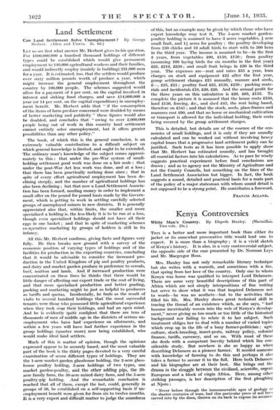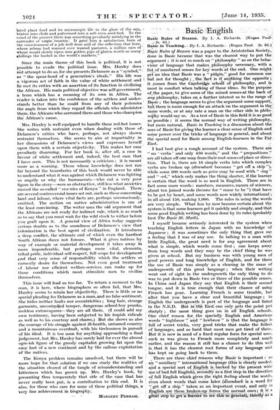Kenya Controversies
• Tins is a better and more important book than either its jacket or its somewhat provocative title would lead one to expect. It is more than a biography ; it is a vivid sketch of Kenya's history. It is also, in a very controversial subject, the opposite side of the case presented by Dr. Norman Leys and Mr. Macgregor Ross.
Mrs. Huxley has not only remarkable literary technique but she writes with a warmth, and sometimes with a fire, that spring from her love of the country. Only one to whom Kenya was home was qualified to interpret Lord Delamere. There are some very beautiful descriptions of this part of Africa which are not simply interpositions of fine writing but serve to show what it was that inspired Delamere not to words—he was no aesthete—but to the activities that filled his life. Mrs. Huxley shows great technical skill in tracing the thread of an existence which, as she says, " had become inextricably woven into the web of Kenya's develop- ment," never giving us too much or too little of the historical background nor failing to relate it to her subject. Such treatment obliges her to deal with a number of varied topics which crop up in the life of a busy farmer-Politician ; agri- culture, stock-breeding, insect-pests, railway policy, colonial finance, tariffs, currency, and so on. With most Of these she deals with a competent brevity behind which lies con- siderable study. But nowhere is she so happy as when describing Delamere as a pioneer farmer. It needed someone with knowledge of farming to do this and perhaps it also takes a farmer to savour it to the full. Here both Delamere and his biographer are at their best. She brings out the drama in the struggle between the civilized, scientific, urgent European and a block of virgin Africa. Here, among other striking passages, is her description of the first ploughing at Njoro : " Never before through the immeasureable ages of geology or the shorter centuries of man, had this particular piece of soil been carved into by the discs, thrown on its back to expose its accurou•
lated plant food and its microscopic life to the glare of the sin, beaten into clock; and pulverised into a soft even seed-bed. To the • mind of the pioneer there was something peculiarly satisfying in the
surrender of virgin -eCuntry: gaVe him a satisfaction born of the consciousness of a job well done and of the reflection that here, where zebras had roamed over wasted pastures, a million ears of Wheat would slowly ripen into golden pips of gluten worth so many &] illings the bushel in the world's markets."
Since the main theme of this book is political, it is not passible to evade thepolitical' issue. Mrs: Huxley does - not attempt to do so, for she presents Delamere as a " symbol,"; as " the spear-head of a generation's ideals." His life was a vigorous act of faith in the value of white settlement and he met its critics with an assertion-of.its function in civilizing the African. His main political objective was self-government, a term which has a meaning of its own in Africa. The reader is taken into the confidence of the settlers and under- stands better than he could from any of their polemics the angle from which they regard the officials who administer them, the Africans who surround them and those who champion the African's cause.
Mrs. Huxley is well equipped to handle these red-hot issues- She writes with restraint even when dealing with those of . Delamere's critics who have, perhaps, not always shown restraint themselves. She seems to aim at impartiality in her discussions of Delamere's views and expresses herself - upon them with a certain objectivity. This makes her case peculiarly disarming. For her book is, after all, a case in favour of white settlement and, indeed, the best case that I have seen. This is not necessarily a criticism ; it is meant more as a warning. Those whose knowledge does not run - fir beyond the boundaries of this book would never be able - to understand what it was against which Delamere was fighting so angrily or why the bureaucrats—who cut a very poor figure in the story—were so obstructive, still less what anxieties Moved the so-called enemies of Kenya " in England. There , are several controversial issues set out, such as those concerning - land and labour, where vital facts are, perhaps unconsciously, omitted. The section on native administration is one of the least convincing. The writer uses the old argument that the Africans are not ready for indirect rule, which is as much as to say that you must wait for the wild stock to wither before you graft upon it. A general view of Africa today suggests serious doubts as to the soundness of Delamere's view that Colonization is the best agent of Civilization; It introduces a deep conflict, the ultimate end of which even the hardiest South African dares not foresee. What it gives natives by way of example or material development it takes away in more imponderable, but perhaps more vital, elements, tribal pride, individual self-respect, full scope for development And that very sense of responsibility which the settlers so earnestly desire for themselves. Not even good treatment of labour nor efficient welfare-services can make up for those conditions which most stimulate men to civilize themselves.
This issue will lead us too far. To return a moment to the man, it is here, where biographers so often fail, that Mrs. Huxley seems to retain her objectivity. There is little or no special pleading for Delamere as a man,.and no false sentiment. She hides neither faults nor eccentricities ; long hair, strange garments, uncontiplied temper, dangerous school-boy pranks, reckless extravagance—they are all there. (I could add my own testimony, having been subjected to his impish ridicule as well as to his courtesy and charm.) But she shows us also the courage of his struggle against ill-health, untamed country and a mountainous overdraft, with his tirelessness in pursuit of his ideal. It is too, soon for anything approaching a final judgement, but Mrs. Huxley hai surely laid for ever the almost ogre-ish figure of the greedy capitalist growing fat upon the easy loot of a new Continent and by the callous exploitation of the natives.
The Kenya problem remains unsolved, but there will be more hope for that solution if we can study the realities of
the situation cleared of the tangle of misunderstanding and bitterness which has grown up. Mrs. Huxley's book, by presenting thus temperately that side of the case that has never really been put, • is a contribution to this end. It is also, for those who care for none of these political things, a very fine achievement in biograirhy.
MARGERY -PERHAM:



















































 Previous page
Previous page